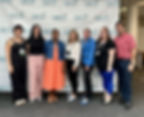An Interview with Denique "Neeky" Dennis, Senior Consultant
- Denique "Neeky" Dennis
- Aug 16, 2024
- 3 min read

In April 2024, Denique Dennis – who goes by Neeky – joined Fourth Economy + Steer, bringing almost a decade of experience in equitable community development to the team. She holds a Masters in Social Administration and Nonprofit Management from Case Western Reserve University and in 2019 was recognized as a 30 Under 30 Changemaker by Ignite Caribbean for her commitment to advancing the areas of gender and socioeconomic justice.
We asked Neeky a few questions about her role, past experience as a social impact consultant in the US and Caribbean, and what she’s excited to accomplish at Fourth Economy in 2024. Finally, we also asked Neeky about her work as an advocate to end sexual violence and how it intersects with community development.
You are a Senior Consultant for Fourth Economy. What does that entail? What does your work look like on any given day?
Honestly, no two days are the same. As the newest addition to the Fourth Economy team, I spend a great deal of time getting acquainted with the company's breadth of expertise and experiences, supporting existing endeavors, and identifying opportunities to deepen our impact and footprint across the Midwest region.
To date, I’ve gotten to support a wide range of projects including impact evaluations for a community-based organization and trade association, city-wide engagement efforts toward the development of a housing strategy, and economic strategy planning for a community development corporation (CDC).
Before coming to Fourth Economy, you worked with Caribbean and US-based non-governmental organizations (NGOs), corporations, and local governments in Jamaica to lead community development efforts. What led you to this work, and tell us about the project you learned the most from?
I am the embodiment of the phrase “to whom much is given, much is required.” My life’s journey has often led me to being among the first, the few, or the only as I’ve sought a better life for myself and my family. I’m often in the minority – racially, socioeconomically, culturally – and the learning curve is always steep. In addition to my faith, I’ve always had one key asset: a supportive community of family, friends, and family friends that is always willing to support me with what little they have. Because of this, the goal of my work is twofold:
break down systemic barriers that hinder the full participation of marginalized peoples
recognize and leverage both formal and informal community assets (one of my favorite ways to do this is through the principle of appreciative inquiry).
The project that I learned the most from was the Greater Cleveland COVID-19 Rapid Response Fund. While the pandemic was a difficult time for all, it allowed us to fundamentally rethink how social impact sector players (public, private, and philanthropic) can and should work together, and how far and fast we can go when we pool our assets.
You began your career as a social impact strategist in Northern Ohio, and currently live in Cleveland. What have you learned about community development from working within your own community?
I truly believe that the most important and impactful work I do happens when I’m off the clock. My husband and I pride ourselves on being community builders – from where we’ve chosen to live, how we invest our time and treasures, our urban gardening adventures, to the rotation of diverse faces at our dining table for Friday evening meals. We strive daily to create the places of inclusion, wholeness, and regeneration we talk about. This gives us a chance to live with integrity, keeping our ethos of community-building embedded in all we do.
What do you hope to accomplish with Fourth Economy this year?
As a company, we support a wide range of projects and sectors. In my first year, I hope to gain a strong understanding of all the facets of our work and capabilities in order to be flexible in my support of our endeavors.

Board members of the Ohio Alliance to End Sexual Violence (OAESV) pictured at a recent meeting. Neeky is pictured third from left.
You previously served as the Board President for the Ohio Alliance to End Sexual Violence (OAESV) and in the past have worked as a human trafficking survivor advocate. What do you wish more people knew about this issue, and how it affects communities more broadly?
It’s imperative that everyone understands just how far-reaching the issues of human trafficking and sexual violence are. One of the things I’m most proud of OAESV for is their adoption of an anti-oppression/anti-racism lens to guide their work. At their core, these are often issues of power, and we cannot address them in a silo without naming and working to eradicate oppression in all its forms.
